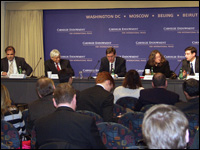Registration
You will receive an email confirming your registration.
IMGXYZ827IMGZYX Ashley J. Tellis presented the findings of his new policy brief, “Pakistan—Conflicted Ally in the War on Terror,” at the Carnegie Endowment on December 17, 2007. Dan Markey, of the Coucil on Foreign Relations, Christine Fair, George Perkovich, and Frederic Grare participated in the panel discussion following Tellis' presentation. The received wisdom about Pakistan is that Pakistan must do much more to fulfill its counterterrorism commitments. Tellis said he broadly agreed with that assessment, but said it was incomplete. Pakistan’s has given a lackluster performance in counterterrorism because it has been unmotivated, but also because of extraneous factors beyond the immediate control of Islamabad. The U.S. might make unreasonable demands if it believes that the Pakistan is entirely to blame.
It’s widely recognized that Pakistan was coerced into participation in the war on terror, said Tellis. As such, its counterterrorism strategy has not been uniform. The strategy has three components; first, the domestic Islamic extremists in the Federally Administered Tribal Areas (FATA): second, anti-India terrorists predominantly based in Kashmir, but also in other parts of India: and thirdly, the non-South Asian terrorists who fled Afghanistan into Pakistan following the collapse of the Taliban. Groups have been targeted based on whether they were seen as a threat to domestic security. The terrorist groups in Kashmir were attacked just enough to prevent war with India. With regard to the Taliban, Tellis said that there was a tactical decision to leave alone the leadership, in part because the leaders of the Taliban had close links with the Pakistani military, and the government did not want to completely write off its investments with those groups. As a result, most of Pakistan’s efforts have been directed at Al Qaeda, the target of greatest interest to the U.S., and therefore the target that brought the biggest payoff.
Pakistan’s approach to the war on terror has thus contrasted to that of President Bush, who cast the war in stark universalist terms. The discrepancy between the U.S. and Pakistani wars has had three consequences, Tellis said. First, according to the National Intelligence Estimate, the leadership of Al Qaeda has regenerated in the sanctuary it has received in the FATA. Second, formerly disparate terrorists groups based in the East and the West have now developed links. And third, sectarian conflict in Pakistan has not been significantly diminished.
But these motivational constraints are matched by a lack of capabilities. Tellis said that the Pakistani army is a conventional force trained for protecting territory from another conventional army, namely, India’s. It’s a force that is overly reliant on firepower, and therefore bad at counterinsurgency.
Tellis concluded his talk by turning to the U.S.’s policy options with regard to Pakistan’s participation in the war on terror. Imposing conditions on aid to Pakistan isn’t feasible, said Tellis, both because it would alienate moderate Pakistanis. Second, the U.S. could announce a policy of unliteral stikes. But, said Tellis, such a policy would inflame Pakistani public opinion, which is unnecessary since the U.S. can already exercise that option if necessary. Third, the U.S. could declare Pakistan an adversary, a strategy which would be disastrous given the need to have an ally in the region, and the fact that Pakistan is a nuclear power. Fourth, the U.S. could continue with the policy it currently has.
Tellis endorsed this final policy option, but believed that it could be usefully modified. Aid ought to be restructured to specific objectives and missions, and the U.S. should engage in more cooperation with the Pakistani military as a way of demonstrating that the U.S. is in the region for the long haul.
